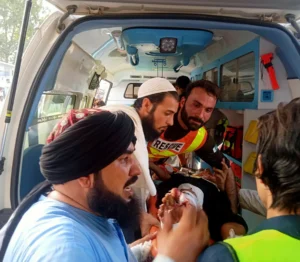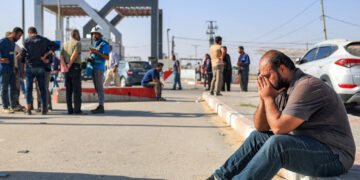
A tragic incident unfolded in Pakistan’s Khyber Pakhtunkhwa province as a suicide bomber targeted a police station, resulting in the loss of at least four security personnel lives and leaving 24 others injured. The attacker detonated an explosive-laden vehicle at the main gate of the police station, initiating a devastating sequence of events. After the explosion, militants engaged security forces in a shootout, amplifying the chaos in the region.
The Pakistani Taliban swiftly claimed responsibility for the attack, highlighting the ongoing security challenges faced by the region. The assailants not only employed a suicide bombing tactic but also launched a mortar attack, intensifying the assault on the police station.
Amidst the ongoing confrontation, security forces managed to eliminate two terrorists during the exchange of gunfire, as reported by ARY News channel. The incident occurred in Dera Ismail Khan, situated in the Afghan border region of Khyber Pakhtunkhwa, a former stronghold of the militant Pakistani Taliban group, also known as drag-e-Taliban Pakistan (TTP).
As the situation unfolds, the repercussions of this brazen attack reverberate through the region, underscoring the persistent challenges posed by extremist groups. The security forces’ continued efforts to neutralise threats reflect the ongoing struggle to maintain stability in areas historically marked by militant activities.
Critical Shortage in Karachi: Life-Saving Drugs, Including Insulin, Alarmingly Scarce, Reveals Report
The recent violence in Khyber Pakhtunkhwa reflects a concerning trend in the province, which has experienced a surge in deadly attacks. This incident is not isolated, as the region has experienced a surge in deadly attacks, which raises significant security concerns.In January 2023, the province witnessed a devastating attack when a suicide bomber targeted a mosque in Peshawar, resulting in the tragic loss of at least 101 lives. The recurrence of such incidents underscores the challenges faced by the security forces in maintaining stability and safeguarding the lives of the residents in Khyber Pakhtunkhwa. The ongoing situation necessitates a comprehensive approach to address the root causes of violence and strengthen security measures to protect the vulnerable communities in the region.
Pakistan’s Counterclaim: Farooq Abdullah Corrects Amit Shah’s Assertion on Poonch and Rajouri
In the aftermath of the recent attack, no entity has immediately claimed responsibility. However, the spotlight of suspicion is likely to fall on the Pakistani Taliban, a group that has escalated its attacks on security forces since 2022. Authorities point to the increasing boldness of insurgents who have found refuge in Afghanistan following the Taliban’s takeover of the country in 2021. The evolving situation underscores the challenges posed by cross-border dynamics and the continued threat posed by militant groups operating in the region. The track-e-Taliban Pakistan (TTP), while distinct from the Afghan Taliban, maintains a close alliance with the group. The recent attack in Dera Ismail Khan adds to the security challenges in the region. Situated near South Waziristan, a former sanctuary for militants, the area has been a focal point for Pakistan’s military operations against extremist elements. It intensified these operations following a tragic incident in 2014 when militants attacked an army-run school, resulting in the loss of over 150 lives, predominantly school children. The historical context of military responses underscores the persistent efforts to curb militant activities and enhance security in regions susceptible to such threats.










_after_crash_landing-360x180.jpg)

































